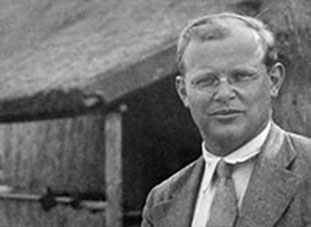A Christian Moderate: Neither Left nor Right
// December 29th, 2014 // Articles
Most of us know that the greatest commandment given by Jesus was to love God, and the second was to love one another. Unfortunately, when it comes to the Christian experience, this is often lost. We seem to spend so much time arguing over our differences and theology that could have been spent loving each other. In fact, some people have rationalized that correcting another’s theology is an ultimate expression of love — to which I would reply:
Suppose a brother or a sister is without clothes and daily food. If one of you says to them, “Go in peace; keep warm and well fed,” but does nothing about their physical needs, what good is it? – James 2
Love people by meeting their true needs, which we only learn by humbly asking, not independently deciding.
The Middle Road
A problem I experience often is that my moderate theology is not satisfactory for my brothers and sisters on the far right or left. One might state that it is nearly impossible to satisfy people at the extremes and so be encouraged to abandon the effort entirely. The reality is that I wish to change the church, and to do so I believe I must learn to co-exist with others that have different Christian theology.
How would I like to change the church? To see it become less judgmental, more full of grace, and bound together in unity over Jesus as Lord. Immediately I will get a response from the conservatives and liberals alike. The response typifies what it is like as a Christian moderate.
The conservatives will assume I mean total liberation from any self-control or theology and say it won’t work because people would just be running wild. The liberals will say they cannot possibly endure unity with believers that are so restrictive and dogmatic. Of course, I am proposing neither of these things, but this is the problem inherent in moderation. In my experience conservatives assume I’m liberal, or opposite of them, and liberals assume the same in reverse.
In my life, I have spent more time explaining what I am not saying than I am allowed time to elaborate on my point. Half of my conversation is spent getting rid of straw men. I believe there is a center path, and this moderate path is based on reason. The bible is clear that there are moral standards, and I’m not advocating “ridiculous grace” where we do anything we want. I’m also not advocating that those on the left be forced to do anything they disagree with for the sake of unity, but that instead there is a way to cooperate.
Rejoice in the Lord always; again I will say, rejoice. Let your reasonableness be known to everyone. – Philippians 4
Polarized Society
I think there is a psychological preference that we have for choosing a “team.” At the same time it seems that polarization is teaching us to think less, love less, and have more conflict. Putting aside theology, we see this trend in society: Democrats vs. Republicans, Black vs. White, Rich vs. Poor. Our side is completely and always right, and the other side is totally wrong and often “evil.” The reality is that both sides offer good things but taking them to extremes usually results in the loss of reason and certainly results in conflict.
How can we speak to these people? I’m hoping that what I write at this moment will be a step. There are wonderful things to be found in perspectives of both “teams.” You’re not required to swallow one side’s view entirely. The middle road is a hard road, I believe, but a good one. I want to be careful here and not fall into the trap of creating my own “team” as well. I think there are several ways to be moderate, and moderates don’t all have to agree — but I want to propose to you that there are two things that we can do as Christians, two things that we are asked to do: be loving and be reasonable.
Reason and Love
Recently a friend proposed to me that God gave us reason — our ability to deeply process reality — because he meant us to use it. I agree. I also believe, as the greatest commandments teach, that our reasoning should always include God’s preference that we love. This reason comes to life when we apply it to unique situations. Not all circumstances are clearly black and white, and our course of action is not always predetermined by a bible verse.
Jesus healed on the Sabbath, proposed that a farmer would save his ox from a ditch on the Sabbath, and said that the Sabbath was made for man, not man for the Sabbath. In other words, we can use our reason in how we apply the Sabbath. (Mark 2:27) Emergencies and compassion (love) override the Sabbath.
Sometimes we may have two truths or two morals in conflict with each other. Dietrich Bonhoeffer faced this dilemma — whether to tell the truth to Nazis or protect innocent lives from terrible death. Which was more important in this case? Bonhoeffer (thankfully) chose to lie to the Nazis for the greater good of love, and eventually came to the conclusion that it was right to do so. Bonhoeffer was a German pastor who became a spy and helped many Jews escape the Nazi regime. He wrote many works before he was executed by the Nazis, you can read more about him here.
A Risky Path
It involves an element of risk to let go of a complete dogma of life and open yourself up to God and reason to lead you in each individual situation. Everything is no longer pre-packaged faith. I believe this is what Jesus did — he only did what he saw his Father doing. (John 5:9) It’s risky because you’ll be in disagreement with many people, yet still be challenged to love those same people. You won’t be able to run to “your side” if things get rough — but you will be able to run to your Father who loves you. If you are a self-defined liberal or conservative, then I only hope you’ll hear what I’m saying: that people you disagree with can still be your brothers. I’m not saying you should change and become a moderate like myself, but only realize that there are many places in the middle where most of us live and operate. If this appeals to you, then today I invite you to start your journey on this road with me.



